
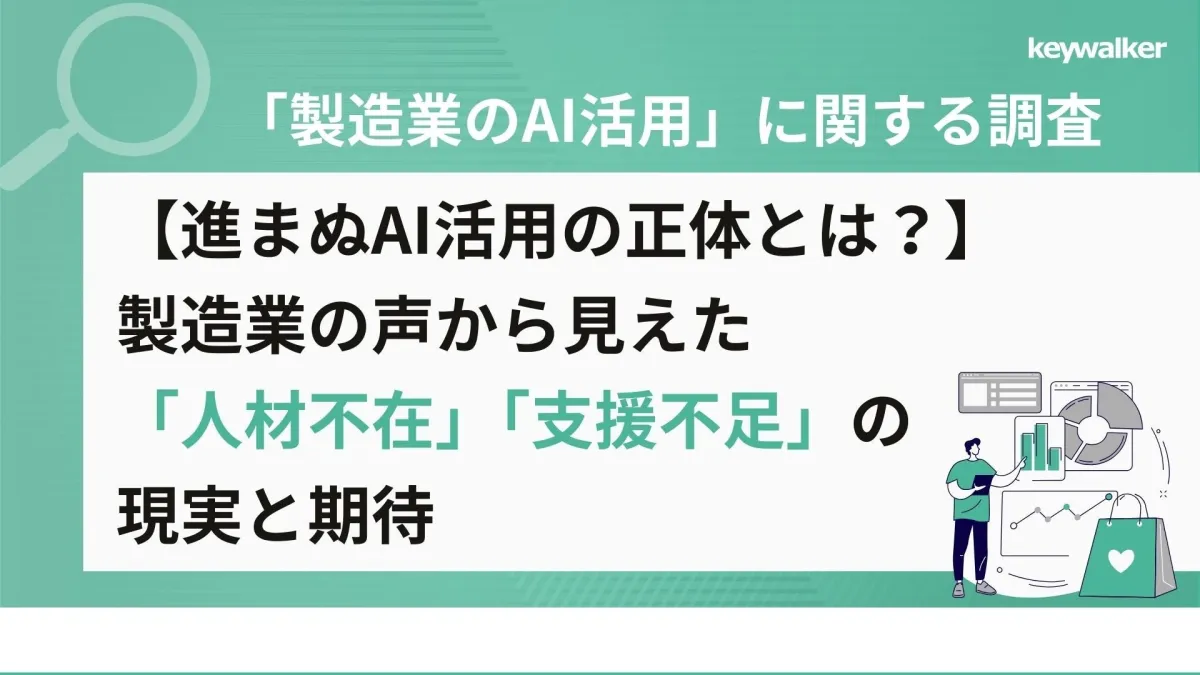
Manufacturing Sector Faces Major Barriers to AI Adoption, Survey Reveals
Barriers to AI Adoption in the Manufacturing Industry
A recent survey conducted by Keywalker, a company based in Minato, Tokyo, sheds light on the state of AI adoption within Japan's vital manufacturing sector. With a growing interest in harnessing AI technologies, the results from the survey indicate that while awareness is increasing, there are substantial barriers still preventing the full implementation of AI solutions.
Increased Interest but Significant Challenges
As AI continues to rise in prominence, the survey conducted among 404 participants—comprising executives, IT managers, and production leaders—revealed that more than 60% of companies in the manufacturing sector have not initiated any AI personnel training programs. This finding points to a critical talent shortage as one of the major impediments to AI adoption. Respondents cited concerns like lack of knowledgeable personnel and the difficulties in aligning AI initiatives with existing operational procedures as primary obstacles.
Survey Findings: Current Adoption Status
The survey results show a stark contrast in AI integration within organizations:
- - 15.1% of respondents are considering AI implementation but have not yet adopted it.
- - 26.3% have implemented AI in certain business areas.
- - 10.6% have fully integrated AI company-wide.
- - A significant 41.8% reported having no plans for adoption.
- - 6.2% were unsure of their status.
These figures indicate that while there is a significant interest in AI, many companies remain hesitant to move forward, opting instead to remain in either contemplation or denial of the need for technological advancement.
Focus Areas for AI Integration
Among those currently considering or already employing AI, the survey highlighted key areas where AI is being leveraged:
- - Production planning and demand forecasting (55.2%)
- - Quality inspection and anomaly detection (48.1%)
- - Equipment maintenance and operational optimization (41.0%)
These areas are crucial as they directly impact efficiency and quality, showcasing that companies believe AI could significantly enhance their operational capabilities.
Challenges in Talent Development
A critical aspect of AI integration cited in the survey concerns the development of skilled personnel capable of effectively using AI tools. Respondents indicated significant barriers in this area:
- - Difficulty balancing AI training with operational responsibilities (35.6%)
- - Shortage of educators or trainers (35.4%)
- - Insufficient time and resources allocated to training (29.6%)
The findings suggest that establishing a foundational workforce equipped to manage AI processes is hindered not only by the existing workload but also by the lack of guidance and resources aimed at education. This scenario raises questions about organizational priorities and resource allocation.
Criteria for AI Tool Selection
In terms of tool selection for AI, the survey responses reveal the priorities of manufacturers:
- - Post-implementation support systems (38.4%)
- - User-friendly interface and operational ease (38.4%)
- - Justifiable implementation and operational costs (38.4%)
This trend suggests that while technology performance is important, the long-term usability and support of AI tools take precedence. It reflects a need for these tools to be user-centric, addressing the operational realities of manufacturers.
Infrastructure and Support Systems
The survey also captured the perceived challenges in establishing a supportive framework for AI integration. A significant 31.9% of respondents acknowledged that their companies lacked a structured support system for pushing AI initiatives forward. Additional concerns included:
- - Difficulty in embedding AI tools within existing workflows (25.6%)
- - Lack of solid data and system infrastructure (22.7%)
The results underscore that simply adopting AI technology is insufficient; organizations must also develop robust supporting frameworks to ensure sustained implementation and growth.
Required Support Strategies
When questioned about external support expectations, respondents emphasized the importance of:
- - Training programs for employees (38.4%)
- - Operational support for tools and resources (33.4%)
- - Comprehensive post-implementation assistance (32.4%)
These results affirm that companies see the necessity of not just initial training but ongoing support systems to foster a culture of ongoing AI utilization
Conclusion
The survey reflects a dichotomy in AI adoption within Japan’s manufacturing industry, with a significant portion exploring or utilizing AI and an alarming percentage resistant to adoption. The findings emphasize the need for systematic training and robust support mechanisms tailored for AI deployment. Ultimately, successful integration hinges upon the collaboration between operations and leadership to devise unified strategies for AI adoption and talent development. For more detailed results and insights, the full white paper is available for download from Keywalker’s website.

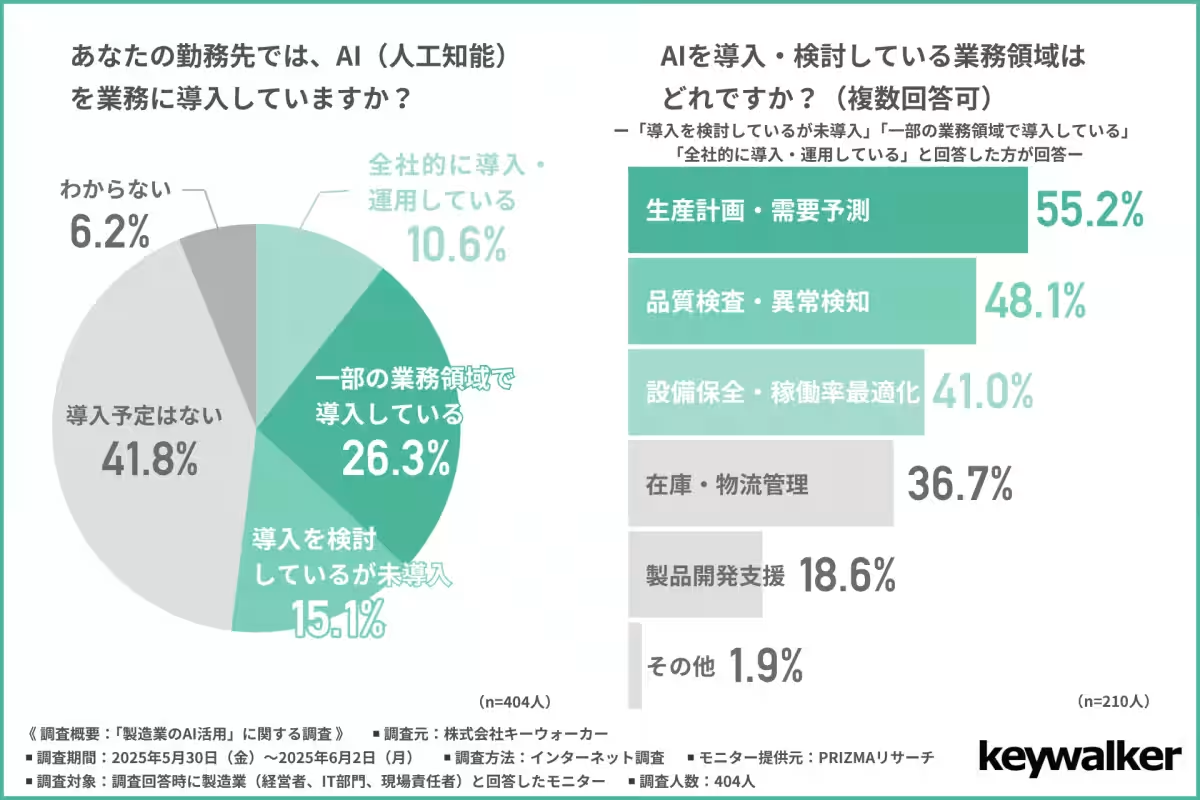
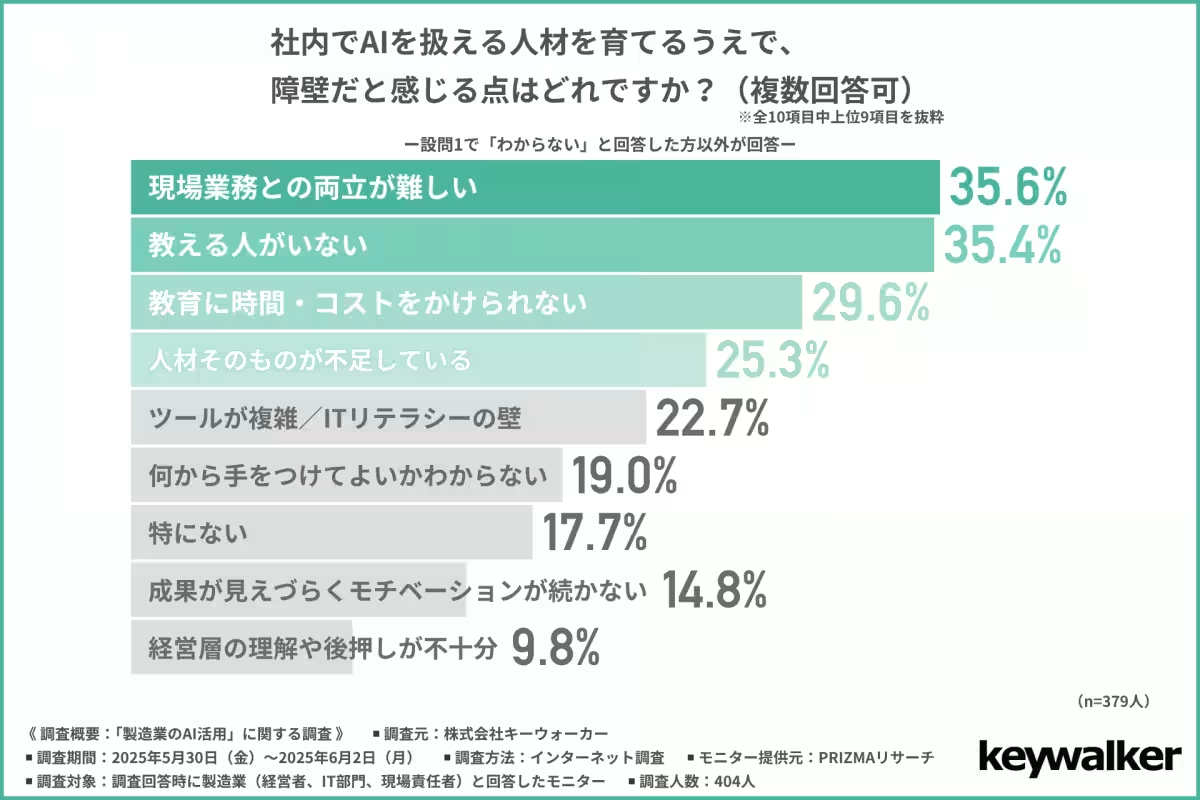
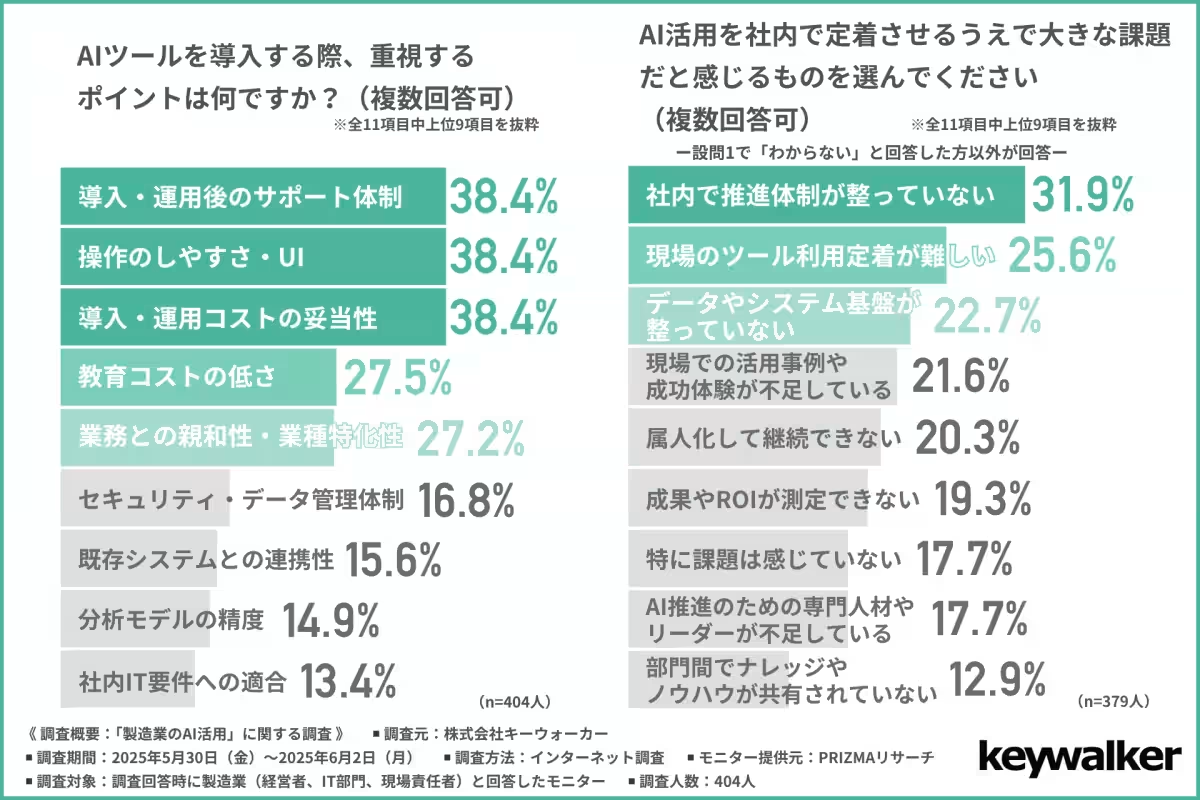
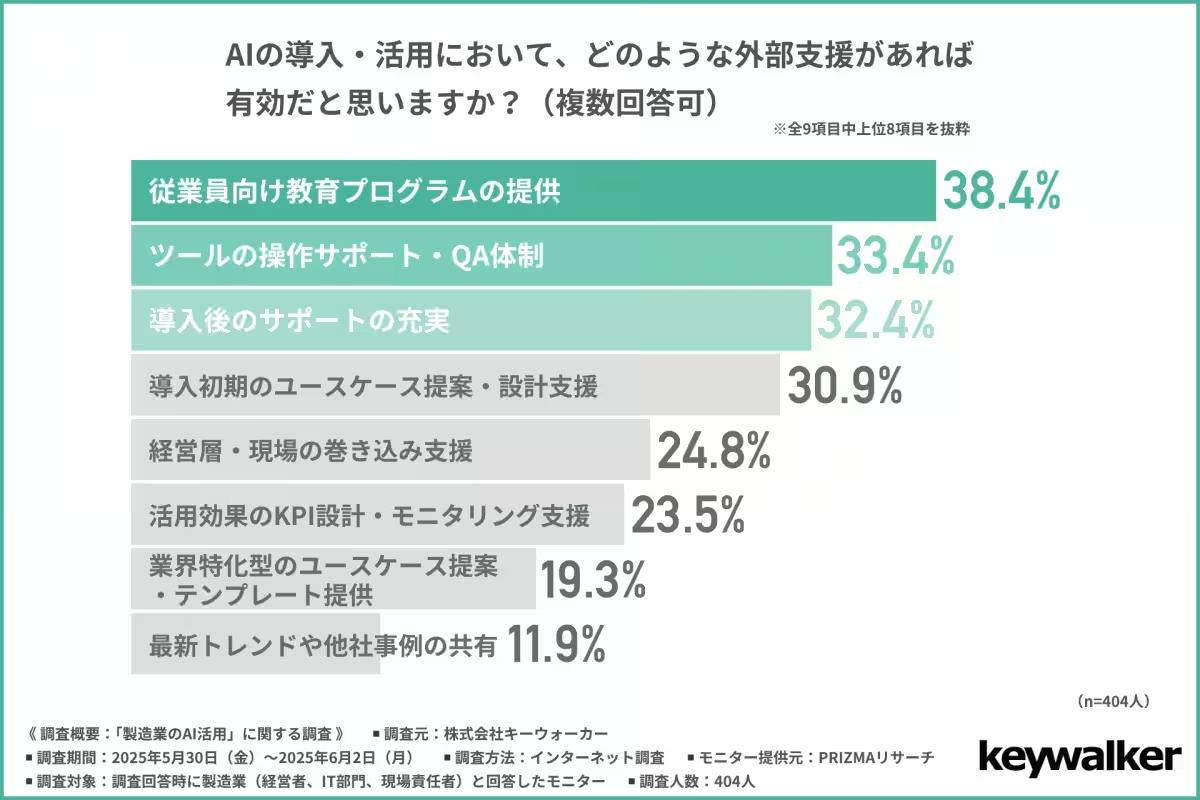

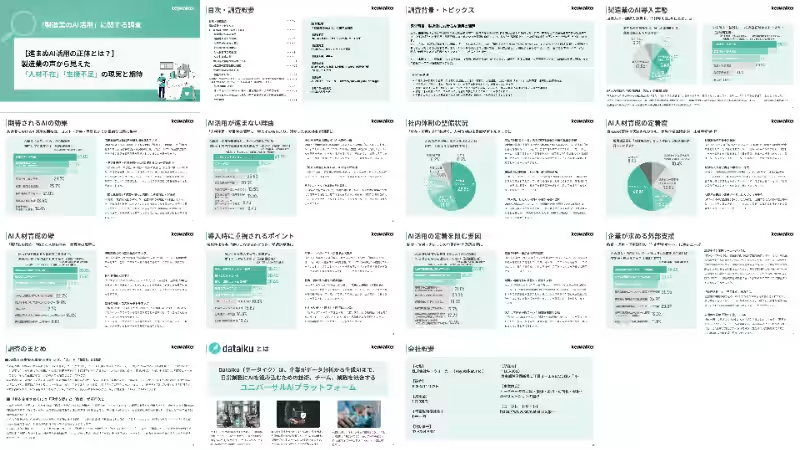
Topics Consumer Products & Retail)










【About Using Articles】
You can freely use the title and article content by linking to the page where the article is posted.
※ Images cannot be used.
【About Links】
Links are free to use.